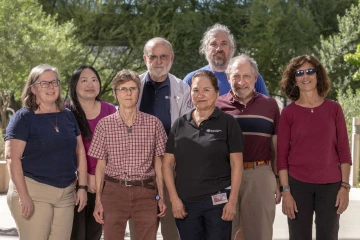Valley Fever Center for Excellence receives innovation award
The Valley Fever Center for Excellence at the University of Arizona College of Medicine – Tucson received the Innovator of the Year Academia Award from the Arizona Technology Council in partnership with the Arizona Commerce Authority. The award was presented at the 21st Annual Governor’s Celebration of Innovation Awards on Nov. 13.

The Valley Fever Center for Excellence team at the University of Arizona College of Medicine – Tucson.
Photo by Noelle Haro-Gomez, U of A Health Sciences Office of Communications
Valley fever is an infection caused by the inhalation of Coccidioides fungal spores. The most common symptoms include cough, fatigue, chest pain, fever, rash, headache, joint aches and night sweats. Because these symptoms can be caused by other illnesses, a specific laboratory test is needed to identify Valley fever in patients. Two-thirds of all U.S. Valley fever infections are contracted in Arizona, according to the center.
“The award is evidence why it is important to have a center focused on Valley fever, a public health problem so important to Arizona and the rest of the western United States,” said John Galgiani, MD, founder and director of the Valley Fever Center for Excellence and a professor of medicine and immunobiology at the College of Medicine – Tucson. “This innovation, a vaccine to prevent Valley fever, was only discovered because there was a Valley Fever Center for Excellence. The inventors, Marc Orbach, PhD, and Lisa Shubitz, DVM, only came to work together because the VFCE attracted them to this problem.”
Orbach is a professor in the School of Plant Sciences, and Shubitz is a research scientist at the center and an associate research professor in the School of Animal and Comparative Biomedical Sciences. Both schools are in the U of A’s College of Agriculture, Life and Environmental Sciences.
Orbach’s lab developed a vaccine against Valley fever for dogs, and it is in the process of being commercialized as a veterinary product. A National Institutes of Health/National Institute of Allergy and Infectious Diseases contract has been extended to Anivive Lifesciences toward developing a human version of the vaccine.

From left to right, Lisa Shubitz, DVM, John Galgiani, MD, and Marc Orbach, PhD.
Photo by Noelle Haro-Gomez, U of A Health Sciences Office of Communications
“This milestone is an example of how research into the fundamental mechanisms of disease produces unexpected breakthroughs,” Galgiani said. “Dr. Orbach was studying how the Valley fever fungus causes disease. He identified a gene that is essential for the fungus to do this. By deleting the gene, Dr. Orbach created a mutant that Dr. Shubitz showed still produced protective immunity without causing disease. Just like with cancer research, a precise understanding of the biology can result in medical progress to help people and, in this case, dogs also.
“That the NIH has awarded our commercial partner, Anivive Lifesciences, a contract to develop our vaccine for humans is a very strong vote of confidence. To qualify for such a contract means that a careful scientific and commercial review of the quality of the project was found to be very promising and important. It should be further encouragement for others to support the vaccine’s development.”
Galgiani studied fungal infections, including Valley fever, when he was a postdoctoral fellow at Stanford University. When he joined the U of A College of Medicine – Tucson in 1978, he said he noticed that virtually no one in Arizona was paying attention to the problem of Valley fever.
“The more I investigated this, the more interesting the problem appeared,” Galgiani said. “Eventually, I realized that it made sense that the U of A should take responsibility for this problem, which is why, in 1996, I was able to convince the Arizona Board of Regents to approve the Valley Fever Center for Excellence.”
Galgiani continued, “In the past several years, leadership within the U of A Health Sciences has come to realize how important the Valley Fever Center for Excellence has become to its mission. Both Michael M.I. Abecassis, MD, MBA, dean of the College of Medicine – Tucson, and Michael D. Dake, MD, senior vice president for the Health Sciences, have provided strong support for the center’s ongoing mission.”

